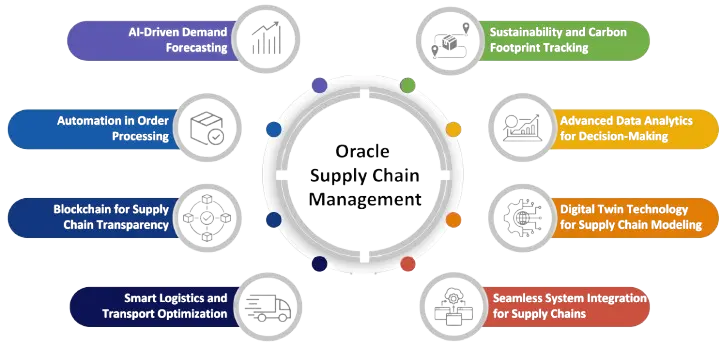Introduction
As global supply chains continue to evolve, businesses must stay informed about emerging trends to improve efficiency, transparency, and resilience. Advancements in technology and strategic operations are shaping the future of supply chain management. Here are the major trends expected to influence supply chain operations in 2025.

- AI-Driven Demand Forecasting
Oracle SCM supports AI-driven demand forecasting, utilizing artificial intelligence and machine learning to enhance accuracy and reduce supply chain disruptions. These technologies enable more precise demand predictions, helping businesses optimize inventory levels. As a result, companies can reduce waste, enhance customer satisfaction, and improve profitability by ensuring the right products are available at the right time.
- Automation in Order Processing
Oracle SCM integrates advanced automation tools, including Robotic Process Automation (RPA), to streamline order-to-cash processes, minimize errors, and accelerate order fulfillment. By leveraging cloud-based automation, businesses can achieve faster order processing and improved cash flow. This shift reduces manual effort, increases operational efficiency, and enhances the customer experience through seamless and error-free transactions.
- Blockchain for Supply Chain Transparency
Oracle SCM supports blockchain technology to enhance product traceability and ensure secure, tamper-proof transaction records. This innovation increases trust, security, and compliance across the supply chain by providing an immutable ledger of transactions. As a result, businesses can reduce fraud, adhere to regulatory requirements more effectively, and foster stronger collaboration with supply chain partners.
- Smart Logistics and Transport Optimization
Oracle SCM integrates AI and IoT-driven logistics solutions to improve shipment tracking and optimize delivery routes for cost savings and efficiency. Real-time tracking and predictive routing allow businesses to lower transportation costs, expedite deliveries, and minimize fuel consumption. This shift towards smart logistics enhances overall supply chain responsiveness and operational efficiency.
- Sustainability and Carbon Footprint Tracking
Oracle SCM offers sustainability tracking tools that enable businesses to monitor and reduce their carbon footprint. Integrated analytics and IoT sensors help companies track emissions and resource consumption, ensuring they meet sustainability goals. These initiatives not only ensure compliance with green regulations but also improve brand reputation by demonstrating a commitment to sustainability.
- Advanced Data Analytics for Decision-Making
Oracle SCM incorporates AI-powered analytics to help organizations make data-driven decisions, forecast trends, and mitigate risks proactively. By leveraging advanced analytics, companies can improve decision-making processes and enhance risk management strategies. The ability to analyze large datasets quickly enables increased agility, better forecasting, and proactive issue resolution.
- Digital Twin Technology for Supply Chain Modeling
Oracle SCM enables the use of digital twins, allowing businesses to simulate supply chain scenarios for better disruption preparedness and operational optimization. Through virtual modeling, companies can develop more effective planning strategies, minimize disruptions, and allocate resources more efficiently. This technology provides operational foresight, enabling businesses to stay ahead of potential supply chain challenges.
- Seamless System Integration for Supply Chains
Oracle SCM offers enhanced cloud-based solutions that support seamless integration between SCM, ERP, and WMS systems. Real-time data sharing and improved cross-functional collaboration lead to more efficient workflows and better operational visibility. The ability to integrate multiple systems enhances decision-making and ensures a cohesive digital supply chain.
Conclusion:
In 2025, supply chains will continue to adopt digital tools, leveraging AI, blockchain, automation, and analytics to improve efficiency and resilience. Companies that adapt to these trends will be better prepared to manage risks, enhance sustainability, and strengthen supply chain performance.
At Intelloger, we help businesses implement practical supply chain solutions that support long-term operational success. Let’s work together to build a more responsive and efficient supply chain.
Recent Posts
- Key Strategic Implementation Best Practices for a Successful Oracle EPM Cloud Deployment Strategy
- Intelloger Partners with Cubic to Drive Digital Transformation for Banking & Financial Institutions
- Intelloger Partners with Acterys to Drive Agile Business Planning, Advanced Analytics, and Innovation
- Intelloger and AI.S2 Partner to Elevate and Streamline AI-Powered Demand Forecasting Solutions
- 6 Proven and Effective Steps to Improving the Financial Close Process with Oracle Solutions




